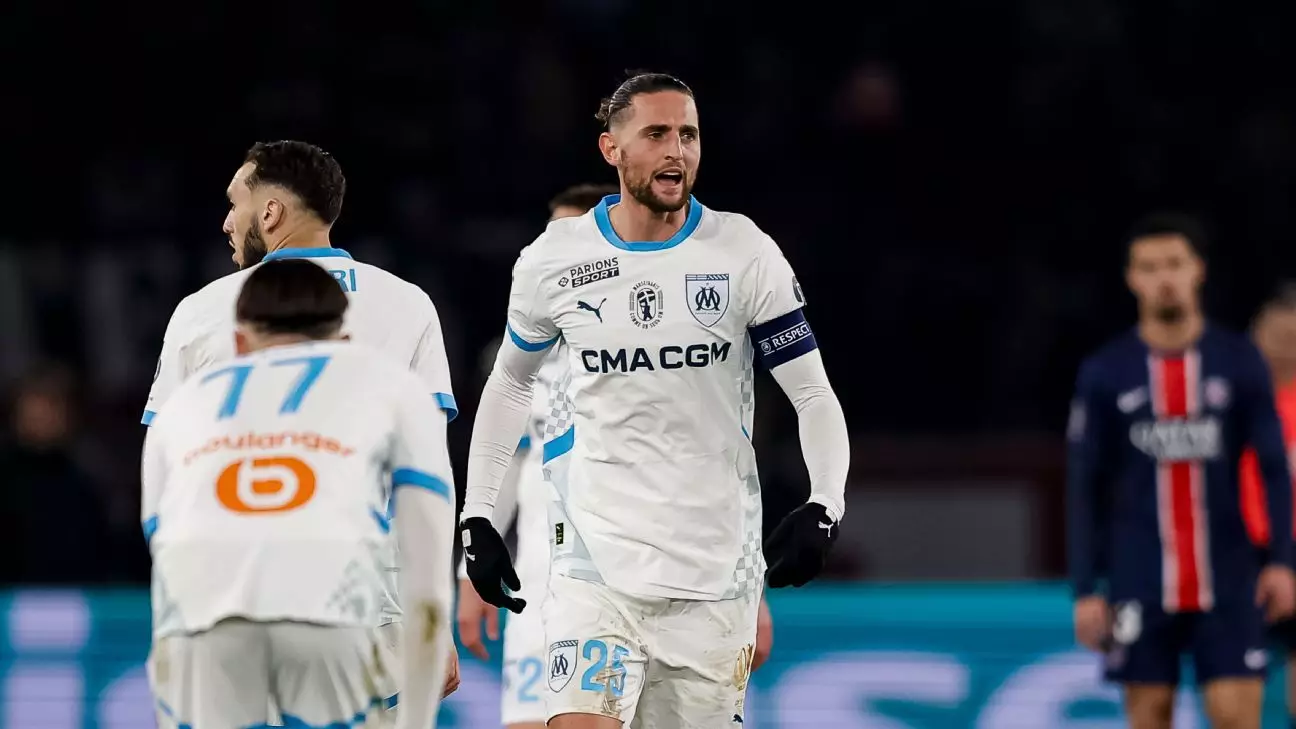In the world of sports, rivalries often lead to heated exchanges, both on and off the field. Yet, nothing creates a tempest quite like a contentious history interspersed with vitriol from fans, as evidenced after the recent Ligue 1 clash between Marseille and Paris Saint-Germain (PSG). Following a 3-1 defeat at the hands of the league leaders, Marseille midfielder Adrien Rabiot took to social media, issuing a cutting rebuke to PSG’s president, Nasser Al-Khelaifi, asserting that “you can’t buy class.” It’s a statement that resonates beyond the confines of the financial power plays in football; it touches on dignity, respect, and the fundamental ethos of sportsmanship.
The Toxicity of Fans
The atmosphere surrounding the match was charged, but not just with the typical excitement of a high-stakes football fixture. The event was marred by anti-gay chants and derogatory slurs directed primarily at Rabiot, highlighting a dark undercurrent that seems to persist within some factions of the sport’s fanbase. Rabiot, who has a complex relationship with PSG due to his time spent there, faced a deluge of hatred as he returned to the Parc des Princes. His mother, Véronique Rabiot, also came under attack, prompting her to announce a plan to file a complaint after PSG fans displayed offensive banners. The escalation of such incidents showcases a disturbing trend in football, where fans sometimes feel emboldened to voice their prejudiced beliefs in public spaces.
Refereeing Double Standards
Despite the ability of referees like Clément Turpin to halt matches due to anti-gay and racist chants, the fixture went ahead without intervention, raising questions about the enforcement of rules in these high-tension encounters. The glaring inconsistency—where some matches face immediate stoppage due to similar fan behavior while others do not—fuels a narrative of double standards within the sport. It underscores a systemic issue, where the voices of a few toxic individuals can overshadow the integrity and enjoyment of the game for the majority. “I don’t understand why the match wasn’t stopped,” Véronique Rabiot lamented, symbolizing the frustrations felt not only by those targeted but also by many within the sporting community.
Calls for Accountability
In the wake of this incident, the French campaign group Rouge Direct has emerged to advocate for change, demanding the enforcement of stiff penalties against rampant discrimination that has unfortunately normalized itself within stadiums. They are rightly calling upon the government and football authorities to take decisive action regarding the chanting culture among fans. The intensity of such offensive behavior cannot merely be brushed aside; it requires a rigorous approach to penalizing discrimination—one that acknowledges the severity of its impact on the game and society at large.
The Broader Issue of Discrimination
Rabiot’s powerful remarks and the public outcry following the match highlight something dire that extends beyond just a football game; it is indicative of a broader societal issue in France and beyond. The derogatory chants using terms that can be interpreted as racially charged—such as referring to Marseillais as “rats,” a term that carries heavy historical and social connotations—demonstrate the intersections of sports, identity, and prejudice. The responsibility lies not just with the fans who utter these chants, but also with clubs and governing bodies who must commit to an environment free from bigotry.
Rabiot’s Evolution
As a player, Rabiot has experienced a journey filled with obstacles and achievements. Transitioning from PSG, where he garnered over 200 appearances, to a club like Marseille, which embodies stark rivalry with his former team, showcases his resilience. Not merely as a player but as a person, Rabiot has navigated complex social dynamics in French football. This incident exemplifies how sport, intended to be an arena of unity and competitiveness, sometimes regresses into spaces fueled by hate.
Through his words, Rabiot accomplished not just a personal statement, but rather a clarion call that advocates for a more respectful and inclusive environment—one that transcends the confines of football and mirrors the fundamental necessity of humanity itself.

